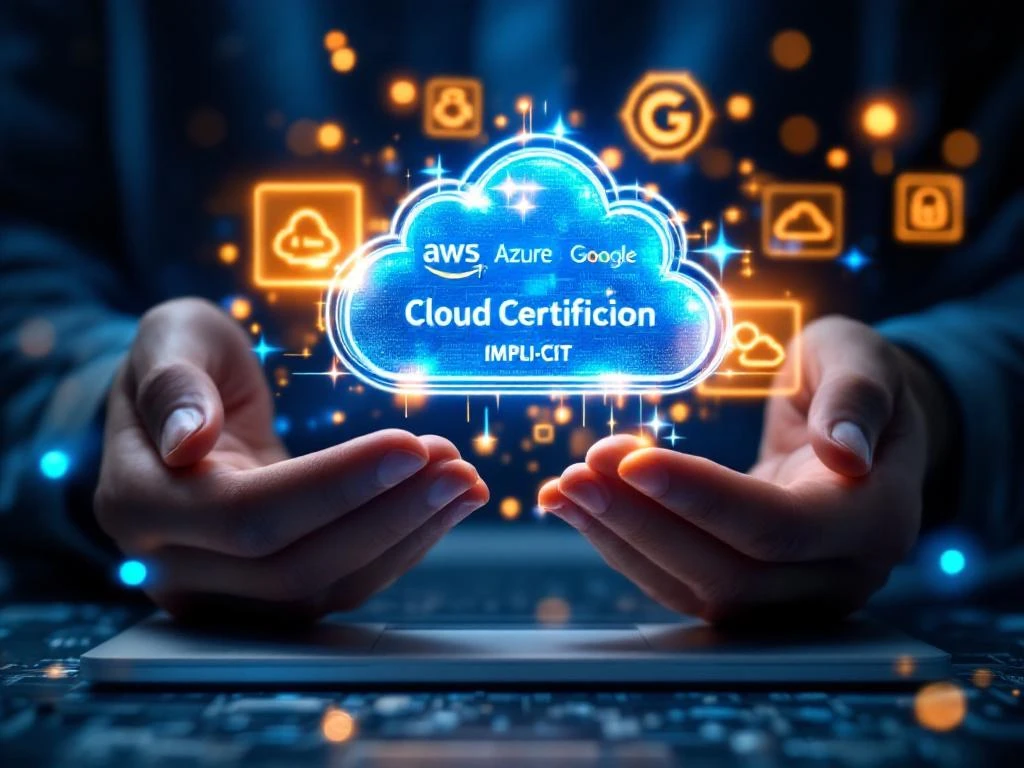
Cloud certifications that benefit onsite support specialists include AWS Cloud Practitioner, Azure Fundamentals (AZ-900), and Google Cloud Digital Leader for entry-level professionals. These certifications help technicians understand hybrid infrastructure, troubleshoot cloud connectivity issues, and support cloud-connected systems effectively. Advanced specialists benefit from AWS SysOps Administrator and Azure Administrator Associate certifications, which enable complex deployment support and migration assistance. As cloud technologies integrate deeper into everyday IT infrastructure, these certifications have become valuable assets for field technicians working in multi-location businesses.
Understanding cloud certifications for onsite support roles
The landscape of onsite IT support has transformed dramatically as cloud technologies become integral to everyday IT infrastructure. Today’s support specialists encounter hybrid environments where on-premises systems connect seamlessly with cloud services, making cloud knowledge no longer optional but necessary for effective field support.
Modern businesses operate with a mix of local servers, cloud-based applications, and hybrid solutions that require technicians to understand both traditional and cloud architectures. When you’re troubleshooting a connectivity issue at a retail location, you might need to diagnose whether the problem lies with the local network, the cloud service provider, or the integration between them. This reality makes cloud certifications increasingly valuable for field technicians who want to provide comprehensive support.
The integration of cloud services into everyday operations means support specialists now handle tasks like resetting cloud-based user credentials, troubleshooting software-as-a-service (SaaS) applications, and ensuring proper connectivity between local devices and cloud resources. Understanding these technologies through formal certification helps technicians resolve issues faster and communicate more effectively with both end-users and remote IT teams.
Which entry-level cloud certifications should onsite support specialists pursue?
For support specialists starting their cloud journey, three foundational certifications stand out as particularly valuable: AWS Cloud Practitioner, Azure Fundamentals (AZ-900), and Google Cloud Digital Leader. These entry-level certifications provide the essential knowledge needed to support cloud-connected systems without requiring deep technical expertise.
AWS Cloud Practitioner offers a broad understanding of Amazon Web Services, covering basic cloud concepts, AWS services, security, and pricing. This certification helps you understand how businesses use AWS services, enabling better troubleshooting when dealing with AWS-connected applications or infrastructure. The exam focuses on practical knowledge rather than hands-on configuration, making it ideal for support specialists who need to understand cloud concepts without becoming cloud architects.
Azure Fundamentals (AZ-900) provides similar foundational knowledge for Microsoft’s cloud platform. Given the widespread use of Microsoft products in corporate environments, this certification proves particularly useful for technicians supporting businesses that use Office 365, Azure Active Directory, or other Microsoft cloud services. You’ll learn about core Azure services, basic cloud concepts, and how Azure integrates with on-premises infrastructure.
Google Cloud Digital Leader rounds out the entry-level options, focusing on how Google Cloud can drive digital transformation. While less common than AWS or Azure in many corporate environments, this certification becomes valuable when supporting organisations using Google Workspace or Google Cloud Platform services.
How do cloud certifications improve troubleshooting capabilities?
Cloud certifications enhance troubleshooting capabilities by providing structured knowledge about how cloud services interact with local infrastructure. When you understand cloud connectivity principles, you can quickly identify whether an issue stems from local network problems, authentication failures, or cloud service disruptions.
One key skill gained through cloud certifications is understanding identity and access management (IAM) basics. Many support tickets involve users unable to access cloud resources, and knowing how cloud authentication works helps you resolve these issues efficiently. You’ll understand concepts like single sign-on (SSO), multi-factor authentication, and how directory services synchronise between on-premises and cloud environments.
Cloud certifications also teach you about hybrid infrastructure diagnostics. You learn to trace connectivity paths from local devices through firewalls and internet connections to cloud endpoints. This knowledge proves invaluable when diagnosing why a point-of-sale system can’t connect to its cloud-based inventory management system or why a manufacturing sensor isn’t uploading data to the cloud analytics platform.
Storage troubleshooting becomes another area where cloud knowledge helps. Understanding different storage types, data redundancy, and backup strategies helps you assist users with data recovery, explain why certain files might be unavailable, and ensure proper data synchronisation between local and cloud storage.
What specialized cloud certifications add value for experienced support specialists?
Experienced support specialists can advance their careers with certifications like AWS SysOps Administrator, Azure Administrator Associate, and vendor-specific cloud networking certifications. These credentials enable handling of complex deployments, migration support, and advanced troubleshooting scenarios that go beyond basic connectivity issues.
AWS SysOps Administrator certification focuses on deployment, management, and operations on AWS. This certification teaches you to manage and maintain AWS workloads, implement security controls, and monitor systems for performance and availability. For support specialists, this knowledge translates into better incident response, more effective system monitoring, and the ability to perform basic administrative tasks without escalating to senior engineers.
Azure Administrator Associate (AZ-104) provides similar depth for Microsoft’s platform. You’ll learn to manage Azure subscriptions, implement storage solutions, configure virtual networks, and manage identities. This certification proves particularly valuable when supporting enterprises heavily invested in the Microsoft ecosystem, as you can handle more complex Azure-related issues independently.
Vendor-specific networking certifications from companies like Cisco or Juniper that include cloud components help support specialists understand how traditional networking concepts apply in cloud environments. These certifications become valuable when troubleshooting hybrid network configurations, VPN connections to cloud resources, or software-defined networking issues.
How can organizations support their onsite teams with cloud training?
Organisations can implement effective cloud certification programmes through training partnerships, certification reimbursement schemes, and structured learning paths. Creating a culture of continuous learning ensures support teams stay current with evolving cloud technologies while improving service quality across all locations.
Training partnerships with cloud providers or educational institutions offer structured learning experiences. Many cloud providers offer free or discounted training for partner organisations, making it cost-effective to upskill entire teams. Companies can also create internal study groups where technicians share knowledge and prepare for certifications together, fostering team collaboration while building expertise.
Certification reimbursement programmes incentivise technicians to pursue relevant certifications by covering exam costs upon successful completion. Some organisations go further by offering bonuses or salary increases tied to certification achievements, creating clear career progression paths for motivated technicians.
We ensure our technicians stay current with cloud technologies through continuous training and certification support. Our approach combines formal certification programmes with hands-on experience, ensuring technicians can apply their cloud knowledge effectively in real-world scenarios. This commitment to ongoing education means our onsite technicians arrive prepared to handle both traditional and cloud-based infrastructure challenges.
By investing in cloud training for support teams, organisations improve their ability to deliver consistent, high-quality services across all locations. Certified technicians resolve issues faster, require less escalation to senior staff, and provide better guidance to end-users navigating hybrid IT environments. This investment in skills development ultimately translates to reduced downtime, improved user satisfaction, and more efficient IT operations across the entire organisation.
Frequently Asked Questions
How long does it typically take to prepare for entry-level cloud certifications like AWS Cloud Practitioner or Azure Fundamentals?
Most technicians can prepare for entry-level cloud certifications in 4-8 weeks with dedicated study time of 1-2 hours daily. The timeline varies based on your existing IT knowledge and experience with cloud services. Using official learning paths, practice exams, and hands-on labs can accelerate your preparation and improve first-attempt pass rates.
Should I pursue multiple cloud certifications or focus on mastering one platform first?
Start by mastering one platform that aligns with your current work environment or career goals, then expand to others. If your organisation primarily uses Microsoft products, begin with Azure certifications; if AWS is prevalent, start there. Once you've gained practical experience with one platform, cross-training becomes easier as core cloud concepts transfer between providers.
What's the actual cost of obtaining cloud certifications, including hidden expenses?
Entry-level certification exams typically cost £75-£150, but total expenses can reach £300-£500 when including study materials, practice exams, and potential retakes. Many providers offer free learning paths, but premium courses, hands-on labs, and practice tests add value. Consider these costs when negotiating certification support with your employer or budgeting for self-funded learning.
How do I maintain cloud certifications once earned, and what are the ongoing requirements?
Most cloud certifications require renewal every 2-3 years through continuing education or re-examination. AWS certifications need 50% discount recertification exams, Azure fundamental certifications don't expire but advanced ones need renewal, and Google certifications require recertification every two years. Stay current by attending webinars, completing online training modules, and documenting your practical cloud experience.
Can cloud certifications help me transition from onsite support to remote or hybrid cloud engineering roles?
Yes, cloud certifications provide a clear pathway from onsite support to cloud-focused roles by demonstrating your commitment to learning and validated skills. Start with foundational certifications while gaining hands-on experience in your current role, then pursue advanced certifications like Solutions Architect or DevOps Engineer. Document your cloud projects and migration experiences to strengthen your transition case.
What practical labs or hands-on experience should I seek alongside certification study?
Set up free-tier cloud accounts to practice creating virtual machines, configuring storage, and managing user permissions. Build projects like hosting a simple website, creating automated backups, or setting up monitoring alerts. Many providers offer sandbox environments and guided labs that won't incur costs. Focus on scenarios relevant to onsite support, such as hybrid connectivity troubleshooting and identity management.
How do I convince my employer to invest in cloud certification training if they seem resistant?
Present a business case highlighting reduced escalation rates, faster issue resolution, and improved customer satisfaction from certified technicians. Calculate potential cost savings from decreased downtime and fewer senior engineer interventions. Propose a pilot programme with one or two technicians to demonstrate ROI before expanding. Emphasise how cloud-certified field technicians can support digital transformation initiatives and handle emerging hybrid infrastructure challenges independently.
What cloud certifications benefit onsite support specialists?
